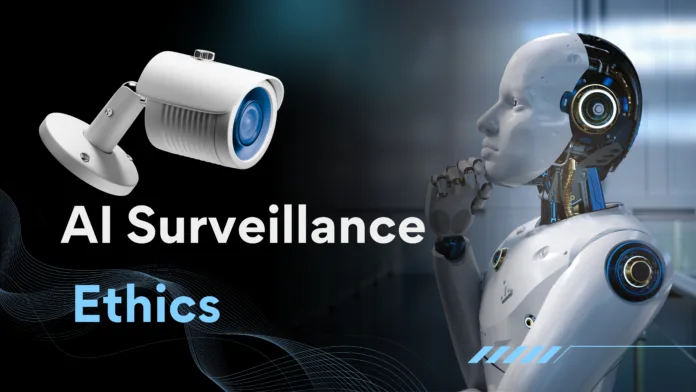
Introduction
In 2025, the world is witnessing a powerful wave of technological growth, but along with it comes growing concern around AI surveillance ethics. From facial recognition systems in public spaces to AI-driven data tracking by private corporations, surveillance technologies are rapidly shaping how societies function.
While tech companies promote AI as a tool for safety, efficiency, and convenience, there’s a growing debate about the lack of transparency, regulation, and consent behind these systems.
So what are they not telling us? Let’s uncover the truth.
🔍 The Rise of AI Surveillance
AI surveillance involves using artificial intelligence to monitor, analyze, and predict human behavior. Today, it’s embedded in:
CCTV systems with facial recognition
Smart home devices that collect voice and behavior data
Public transport cameras
Smart city sensors
Online tracking tools (cookies, algorithms, biometric data)
While many of these tools promise increased security, they often come at the cost of personal privacy and ethical clarity.
🧠 Ethics vs. Innovation: A Growing Gap
Most tech companies race to build smarter surveillance systems… but few stop to consider the ethical impact.
Key concerns include:
Lack of Consent: Many people are monitored without knowing it.
Bias in AI Algorithms: Facial recognition AI has shown bias against people of color and women.
No Clear Regulations: Laws vary by country, and many are outdated.
Private Data Misuse: Companies may collect more data than necessary and use it for targeted advertising or sell it to third parties.
These gaps create a dangerous environment where surveillance becomes normalized, and privacy fades into the background.
🏙️ Smart Cities: Helpful or Harmful?
Many urban areas in 2025 now call themselves “smart cities”—places filled with connected infrastructure that uses AI to manage traffic, monitor air quality, and even detect crime in real-time.
Sounds futuristic and helpful, right?
Well… not always.
Smart cities often collect data from:
Street cameras
License plate readers
Wi-Fi signals
Public transportation tracking
But who controls this data?
In many cases, the private tech companies that build these systems also own the data, raising questions about ownership, control, and surveillance creep.
🎭 Facial Recognition: Security or Surveillance?
Facial recognition technology is perhaps the most controversial form of AI surveillance.
Used by:
Airports
Law enforcement
Shopping malls
Social media platforms
This tech is often framed as a security tool. However, critics argue it has been misused for:
Mass surveillance without warrants
Political repression in authoritarian states
Retail monitoring to track customer behavior
The ethical concern? Most people don’t know they’re being scanned, and they have no option to opt out.
📱 Everyday Surveillance: You’re Being Watched
AI surveillance ethics isn’t just about government control or smart cities—it’s personal.
Here’s how average people are monitored every day:
Smartphones track location data and app usage.
Home assistants like Alexa or Google Home record conversations.
Social media AI profiles your behavior, interests, and emotional state.
Retail stores use cameras and AI to analyze foot traffic and customer mood.
What’s missing? Informed consent.
Users often accept vague terms and conditions without understanding what data is collected or how it’s used.
⚖️ Where Are the Laws?
Right now, there’s a massive gap between technology and regulation.
Some regions have taken action:
The EU’s AI Act tries to classify and restrict high-risk AI systems.
California’s CCPA (Consumer Privacy Act) gives users more control over their data.
Some cities have banned facial recognition altogether.
But globally, there’s no unified framework for ethical AI surveillance.
This lets tech companies operate in grey areas—doing just enough to appear compliant, but not enough to ensure full transparency or fairness.
🚨 What Needs to Change?
To make AI surveillance ethical and fair, several key actions are needed:
Clear Consent Policies
People should always know when they are being monitored and why.Bias Audits
All AI surveillance tools should undergo independent testing for bias and accuracy.Strict Data Regulations
Governments must demand transparency on what data is collected, how it’s stored, and who has access.Public Oversight
Communities should have a say in how surveillance tools are used in their neighborhoods.Ethical Design Standards
AI developers should follow ethical guidelines when building surveillance tools—not just legal ones.
💡 Final Thoughts
AI surveillance in 2025 is a double-edged sword.
On one hand, it offers real benefits: safer streets, faster services, and smarter cities.
But on the other… it raises deep ethical questions about privacy, consent, and freedom.
As the power of AI grows, so does our responsibility to use it wisely.
AI surveillance ethics is not just a tech issue—it’s a human one.
Let’s keep asking questions.
Let’s hold tech companies accountable.
And let’s build a future that’s not only smart—but fa